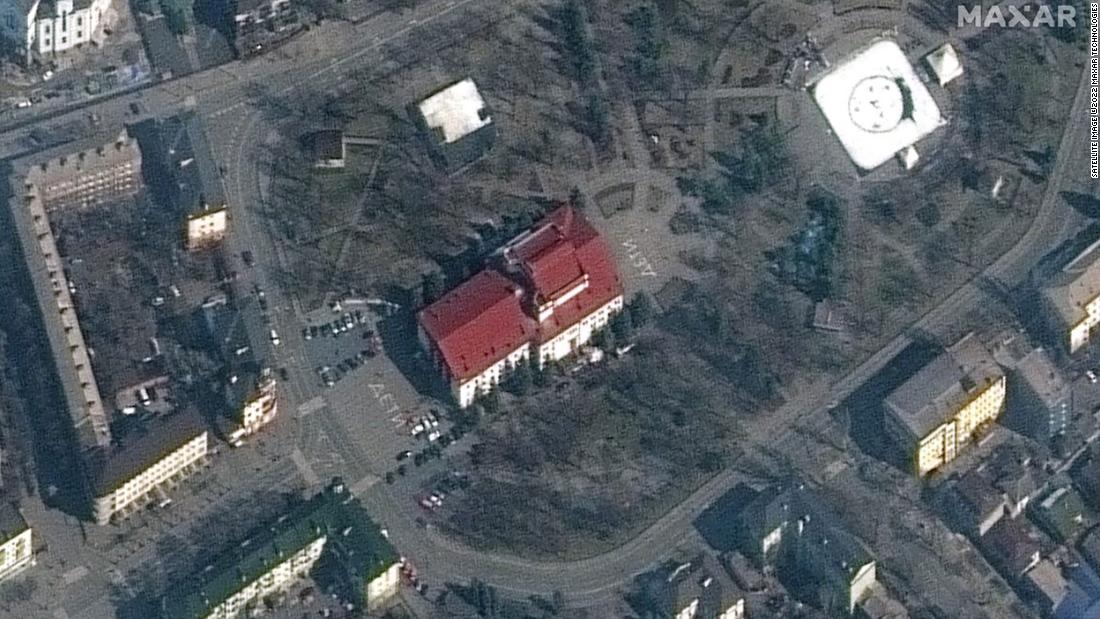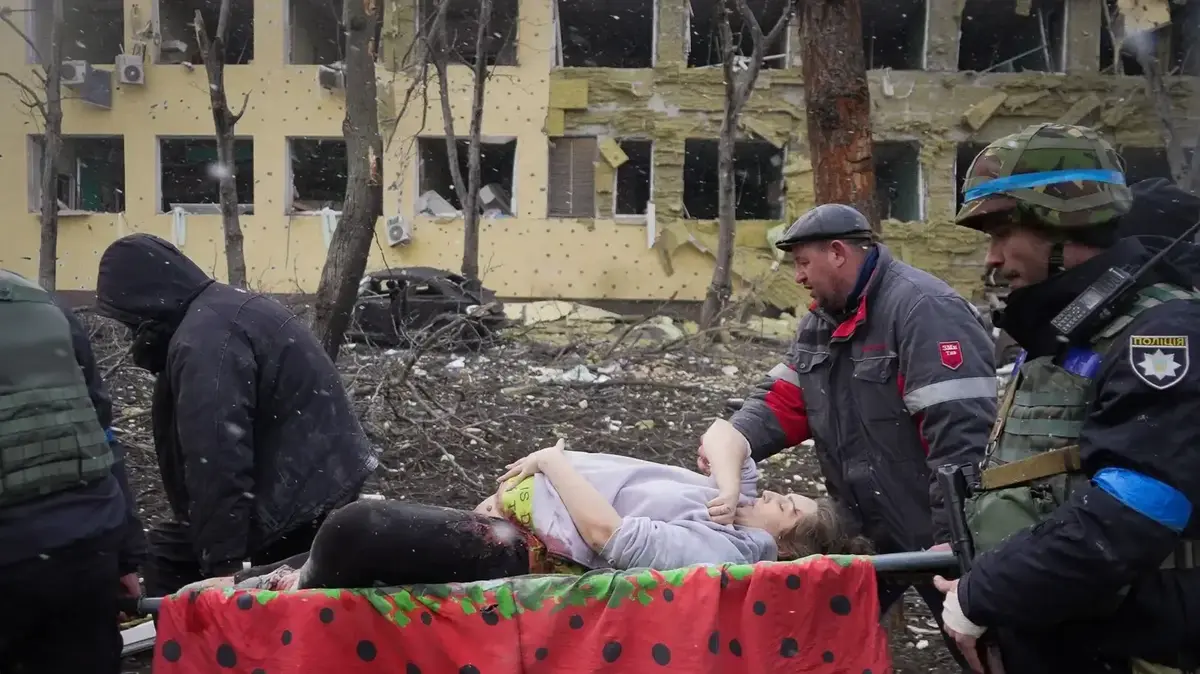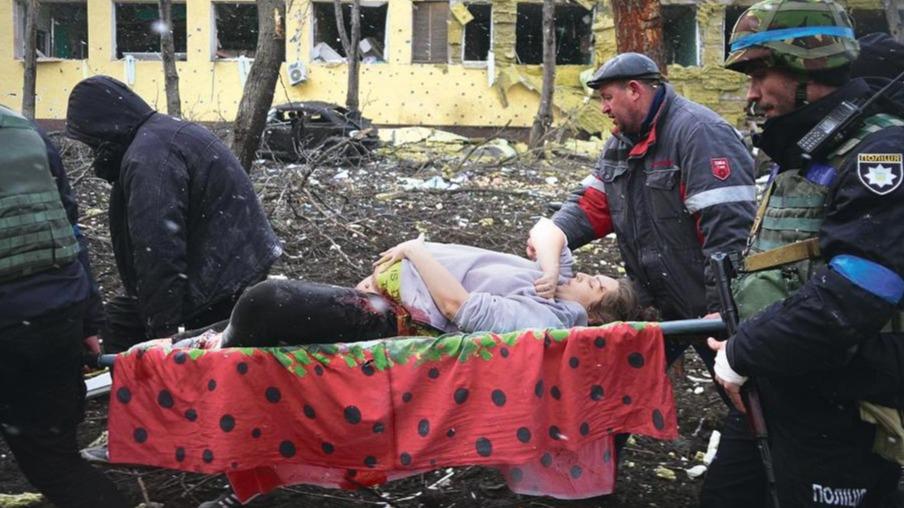Lviv, Ukraine (CNN) --
When Serhii woke up to the news that a bomb had leveled the Mariupol Theater, where hundreds of people were sheltering, she felt like she couldn't breathe.
His wife and two daughters were inside.
A day before the attack, the 56-year-old editor, who lives in Ukraine's capital city of Kyiv, received a panicked call from his 30-year-old daughter.
He had not heard from her since March 1, when Russian forces stepped up their assault on Mariupol, the strategic port city, unleashing a relentless barrage of rockets and bombs from land, sky and sea.
Losing electricity and internet service, Mariupol was largely cut off from the outside world.
Serhii, who asked that only her first name be used for security reasons, was desperately awaiting any news from her family.
Not receiving them, he had no choice but to rely on the grim picture of life and death conveyed by Mariupol officials: residents live in "medieval conditions", forced to melt snow for water and cook food outdoors in open fires.
Civilian targets, including residential buildings, a maternity hospital and the main administration building, were reduced to rubble.
The ceasefire was ignored and humanitarian evacuation corridors were blocked.
advertising
The Russian word ДЕТИ, or "Children", is seen on the grounds of the Mariupol Drama Theater before it was bombed.
It was a situation unthinkable a few weeks ago in this busy industrial city, once known for its spas and a major steel plant, and now the scene of fierce fighting between Russian and Ukrainian forces.
Serhii was worried about his wife, 56, and his daughters, especially the eldest, 36, who lives with a disability and needs daily medication.
But his relief at finally knowing about them was quickly replaced by crippling fear.
In a hurried conversation, the youngest told him that she had been able to charge her phone on a diesel generator, but that she only had a little time to talk.
She explained that her apartment had been destroyed in the bombing and she wasn't sure where they would be safe.
She told him to go to the Drama Theater in the center of town, where officials were organizing buses to evacuate residents.
"When I advised them to move to the theater as an evacuation site, and the next morning I learned that this place had been bombed ... I almost went crazy, insane," Serhii told CNN in a phone call from Kyiv.
"Because I actually sent them to the bombs."
The March 16 bombing of the Mariupol theatre, in which, according to the Ukrainian authorities, some 1,300 people had taken refuge, was one of the most brazen attacks by Russia against the civilian population since its invasion began at the end of February.
On the floor of the building was painted, in giant Cyrillic letters, the word "CHILDREN."
The message, large enough to be seen from the sky, was written near a public square that, before the war, was occupied in summer by children swinging on playgrounds and running through fountains.
Russia has denied that its forces attacked the theater, saying instead that the Azov battalion, the main Ukrainian Army presence in Mariupol, was the one who blew up the building.
"Mariupol is now hell": Survivors and drone footage reveal scale of destruction
After 24 hours of near hysteria, wondering if her family was still alive, Serhii's phone rang.
Her daughter told him that she had left the theater to see an elderly relative shortly before the bomb went off.
She ran back to find the building split in half, with the 600- to 800-seat central auditorium completely flattened, and people drenched in blood and white debris beginning to emerge from the rubble.
They included her sister, who had hidden in a part of the theater that did not collapse, and her mother, who was dug up from the bomb shelter along with other survivors.
The three women, carrying nothing but a backpack with their essential documents, managed to get a ride, along with six other people, in a small vehicle, paying the driver whatever money they had: 2,000 hryvnia, the equivalent of about US $68. The youngest daughter said they got off at a checkpoint guarded by Russian soldiers, and walked almost 20 kilometers to Melekino, where her neighbors have a "dacha," or summer house.
Serhii's daughter told him that the small town, located on the Sea of Azov, is full of displaced people who have arrived from Mariupol, adding that there was no food or fuel left.
"In Melekino there is a real famine, a 'holodomor'. People in the villages have no supplies, absolutely all shops are closed," Serhii said, referring to the man-made famine that gripped the Soviet republic of Ukraine. in the early 1930s, killing millions of people.
The term derives from the Ukrainian words for famine (“holod”) and extermination (“mor”).
The inhabitants of Mariupol cook whatever food they could find outside their homes.
Unable to travel by himself, Serhii frantically searches for a driver to make the perilous journey to retrieve his wife and daughters from the "dacha" where they are camped.
But he hasn't had any luck yet.
It's a terrifying proposition: any volunteer would risk being caught in the crossfire or captured by the Russians.
In the past week, Russian forces have deported thousands of Mariupol residents against their will to cities far away in Russia, according to city officials and witnesses.
And on Monday, Moscow asked Mariupol to surrender, an idea Ukraine quickly rejected.
The harrowing flight of Serhii's family from Mariupol is one of the first stories to come to light from survivors of the theater bombing.
For days, family and friends of those inside the theater have been waiting on edge for news of their fate, posting on local Telegram channels and Facebook groups asking if anyone has seen their loved ones. .
Messages from some of those who have managed to escape the city have not given much hope, describing cellars turned into tombs and streets littered with corpses.
Petro Andriushchenko, adviser to the mayor of Mariupol, told CNN on Sunday that the battle for the city has made it impossible to recover and identify the dead, or treat the wounded.
"We cannot carry out rescue operations under the current conditions: the fighting in the streets, the shelling and the bombs do not stop," he said of the theater attack, adding that many of the estimated 200 survivors are now in other shelters or in the process of being evacuated to Zaporizhia, a city on the banks of the Dnieper River some 225 kilometers away.
Buildings and vehicles destroyed in the bombing of Mariupol.
On Sunday, another attack hit an art school in the city, where Andriushchenko said 400 people were believed to be sheltering.
However, due to the intensity of the fighting and the breakdown of communications, it has been difficult to determine the number of fatalities.
In a video message posted on Facebook in the early hours of Sunday, Ukraine's President Volodymyr Zelensky said the siege of Mariupol would go down in history as a war crime.
"Doing this to a peaceful city ... is a terror that will be remembered for centuries," he added.
But like other cities and towns in eastern and southern Ukraine being strangled by Russian troops, Mariupol has become a black box, with information only beginning to emerge as residents flee.
"I realized that I couldn't wait any longer. We had to go"
After the maternity hospital near Anna Kotelnikova's home was attacked on March 9, sending pregnant mothers through the ruins holding their bellies, she decided to move to her parents' apartment about 10 kilometers to the south. on a block overlooking the Drama Theatre.
Kotelnikova, a 36-year-old anesthesiologist, has been a volunteer with the Ukrainian Army since the spring of 2014, when Russian-backed separatists attacked Mariupol;
separatist forces held the city for a month before the Ukrainian government regained control.
Because of her involvement in the conflict, Kotelnikova was strongly advised to leave Mariupol when Russia invaded Ukraine last month.
She refused, unable to conceive of the vicious siege that awaited her beloved hometown.
But as the bombing got worse and became more unpredictable and indiscriminate, he began to change his mind.
On the night of March 14, she took refuge with her sister, her brother-in-law, her nephew and her parents, who are over 80 years old and lived through the occupation of Mariupol by Nazi Germany, she learned that they had to go.
A photo taken outside the Drama Theater before it was bombed, where people burned branches and debris to keep warm.
"Every day we heard explosions coming, shelling. That night was horrible. From midnight to morning...the shelling didn't stop," he told CNN in a call.
"When the curtain could be opened ... I saw that everything in the direction of my house was black smoke."
"I realized I couldn't wait any longer," he said.
Across the square from her parents' apartment, locals and city officials were organizing the evacuations at the Drama Theater.
Inside, the situation was dire, Kateryna Erskaya, a journalist who had been bringing aid to the scene, told CNN.
Anatomy of a hospital attack: what happened in Mariupol
More than 1,000 people camped inside the unheated building, trying to keep warm in freezing conditions with cardboard boxes, blankets and near-constant fires, he said.
The flames, fueled by bits of destroyed houses and tree branches, were used to cook whatever food people could find.
Most people's phones had run out of battery and signal was poor;
his only sense of the outside world came from the roars of planes overhead and the noise of nearby fighting.
"The sound of fighting was a constant soundtrack," Erskaya said.
On March 16, hours before the attack, he managed to flee the city.
Kotelnikova did the same thing a day earlier, on March 15.
She ran from her parents' apartment to the theater, confirmed that a convoy of more than 200 vehicles was leaving at 9 a.m., and snapped a few photos of the word "CHILDREN" in Cyrillic script written on the ground, before rushing home. to tell his family to pack their bags.
In less than an hour, they were out the door.
Painted on the ground outside the Drama Theater, in giant Cyrillic letters, was the word "CHILDREN."
The message was large enough to be seen from the sky.
On the advice of her friends, she said she wiped her phone, deleting messages, apps and photos, anything that might lead to her being detained by Russian soldiers at a checkpoint on the way out of town, something that , according to city officials and witnesses, has been happening to activists and volunteers like her.
They made it through all the stops and slowly navigated the highway north to Dnipro in central Ukraine.
The trip, which normally takes nine hours, took them two days.
They stopped in the fields as dusk fell, staying on the road to avoid mines and huddled together to keep warm as temperatures dropped to minus 11 degrees.
Kotelnikova said that when the group arrived in Zaporizhia she was overwhelmed with relief.
"She was willing to kneel down and kiss the ground."
Others have not been so lucky.
Julia Paevska, also known as "Taira," an illustrious Ukrainian military doctor known for her bravery and compassion, was captured by Russian forces in Mariupol earlier this month, according to local officials.
Andriushchenko, adviser to the mayor of Mariupol, said Taira was among a number of activists, law enforcement officers, army veterans and volunteers who have been kidnapped by the Russians.
US Ambassador to the United Nations Linda Thomas-Greenfield said on Sunday the reports were "troubling" and "unconscionable" if proven true.
On parts of the journey out of Mariupol, on roads damaged by shelling, Anna Kotelnikova said the convoy was moving at 8 kilometers per hour.
"They fall, as we say, 'into the basement,'" Andriushchenko said, referring to those that have been taken over by the Russians.
"On the one hand, the Russians are simply trying to discredit any sense of possible Ukrainian resistance. At the same time, it is an act of punishment for the 2014-2015 war."
Taira, who was an Aikido martial arts instructor before volunteering as a doctor, was profiled in an award-winning book by conflict reporter Yevgeniya Podobna about 25 women who joined the Armed Forces in 2014. In a 2018 interview, she speculated about what might happen after the war: "We'll see. Maybe I'll be a trainer. Maybe I'll grow roses in a garden. Maybe I'll find another war and go there to save people."
In addition to the missing, like Taira, Mariupol officials say others have been forcibly deported to Russia.
Officials are trying to trace his whereabouts through eyewitness accounts, direct messages and some sympathetic Russians who oppose the war in Ukraine, Andriushchenko said.
"People who have already been deported are in contact with us. That's why we know which cities people are deported to and how it happens. Even when their phones and SIM cards are taken away, they find the opportunity to contact us." said Andriushchenko, who now spends his days fielding a flood of calls and messages from Mariupol residents trying to locate relatives.
His main mission, she told CNN, is to safely get people out and reconnect them with their loved ones.
ANALYSIS |
Russia seems to have a very bad military, and that is not good for Ukrainian civilians
On Monday morning, Ukraine's government rejected Russian calls for Ukrainian forces in Mariupol to lay down their weapons in exchange for "safe passage" out of the city.
It is an ultimatum that Russian President Vladimir Putin has used elsewhere: in Grozny, when the Russian republic of Chechnya revolted in the 1990s, and in Aleppo, where Moscow helped put down a popular uprising against the president. of Syria's Bashar al-Assad in 2015. At the end of the ultimatum: civilians left inside the city, trapped or too scared to flee, facing a "military tribunal" and the wrath of Russia.
For those still anxiously awaiting news of their friends and family trapped in Mariupol, this is terrifying news.
Although her daughters were able to leave the city, Serhii will not be able to rest until they are reunited.
Still, she says, it's a miracle they survived.
"The current destruction is greater than what the Nazis did during World War II," Serhii said.
"This is a 'historical remake', it's another war crime."
-- Olga Voitovych, Oleksandr Fylyppov and Dmytro Olenschenko contributed reporting.







/cloudfront-eu-central-1.images.arcpublishing.com/prisa/U4XRXDOOOZD4JA5V2SJ4KBERUY.jpeg)